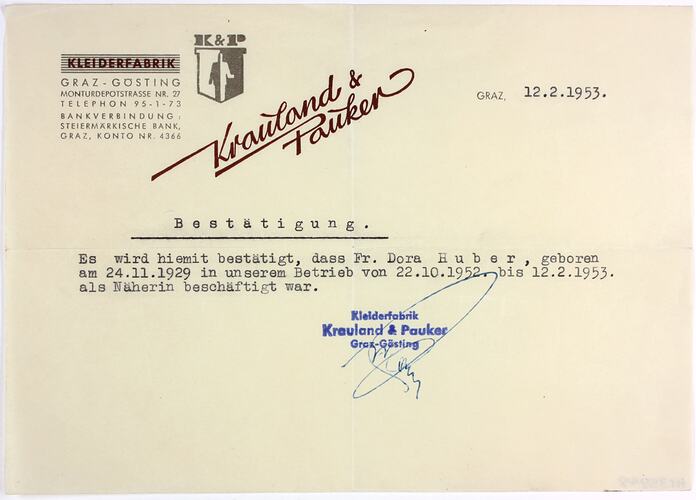Summary
Statement of employment ('Bestatigung' or 'affirmation' in German) for Dorothea Huber from Krauland & Parker, a textile factory in Graz, Austria dated 18 March 1959. The letter is in German; Dorothea was employed there as a seamstress from 22 October 1952 to 12 February 1953. It was amongst the small number of personal possessions brought to Australia by Dorothea [later Huber and then Dunzinger] when she migrated from Austria to Melbourne in November 1959.
Born in 1929 near Graz, Austria, Dorothea was a proficient recreational skier and part of a volunteer rescue team in Switzerland. She lived and worked primarily as a mill weaver and seamstress in England, Switzerland and Austria before migrating to Australia from Austria on 30 November 1959, arriving on the Cogedar Line ship 'Flaminia' on 31 December. She settled in Melbourne and married fellow Austrian Johann Dunzinger whom she met at Broadmeadows migrant hostel. They had a daughter Caroline and lived in various Melbourne suburbs boarding and renting before building a home in Kalorama. The couple divorced in1978. Dorothea worked hard all her life, owning a boutique clothing shop in Camberwell at one stage but primarily as a textile outworker and factory worker trying to make ends meet. She died in 2001.
Physical Description
Single A5 sheet typed document with grey and maroon printed letterhead.
Significance
The Dunzinger Austrian Migrant Collection has evolved to become a rich group of objects which tell a particular story of an Austrian woman's post-war migration experiences, as well as broader contextual narratives relating to the variety of selection and management processes in place in Europe after World War II. These include references to Australian-specific organisations involved in migration management such as the Australian Migration Mission. Items explore the enthusiastic promotional activities of the Australian Government to encourage migration from the UK and Europe in order to populate Australia and build a workforce. Artefacts also relate to a significant Italian migrant ship of the period, the Cogedar Line 'Flotto Lauro'. There are also personal domestic items, clothing, needlecraft, and other personal items brought to Australia making this a well-rounded collection tracing a personal narrative from departure, journey, arrival and early settlement.
There is a also symbolic poignancy about the skis, ski clothing and rucksack, and the small sewing machine Dorothea Dunzinger brought with her from Austria. The skis represent precious mementoes from home and hopes and expectations for the leisure activity they might bring in Australia; the sewing machine a pragmatic object which came to dominate Dorothea's actual settled life of hard work both in the home and as an outworker with no leisure time at all.
More Information
-
Collecting Areas
-
Acquisition Information
Donation from Ms Caroline Dunzinger, 07 Nov 2012
-
Recipient
-
Inscriptions
Letterhead: 'Krauland & Parker'
-
Classification
Migration, Processing - planning & departure, Correspondence
-
Category
-
Discipline
-
Type of item
-
Overall Dimensions
201 mm (Width), 115 mm (Height)
-
Keywords
Austrian Immigration, Post War Migration, Working Life, Sewing
